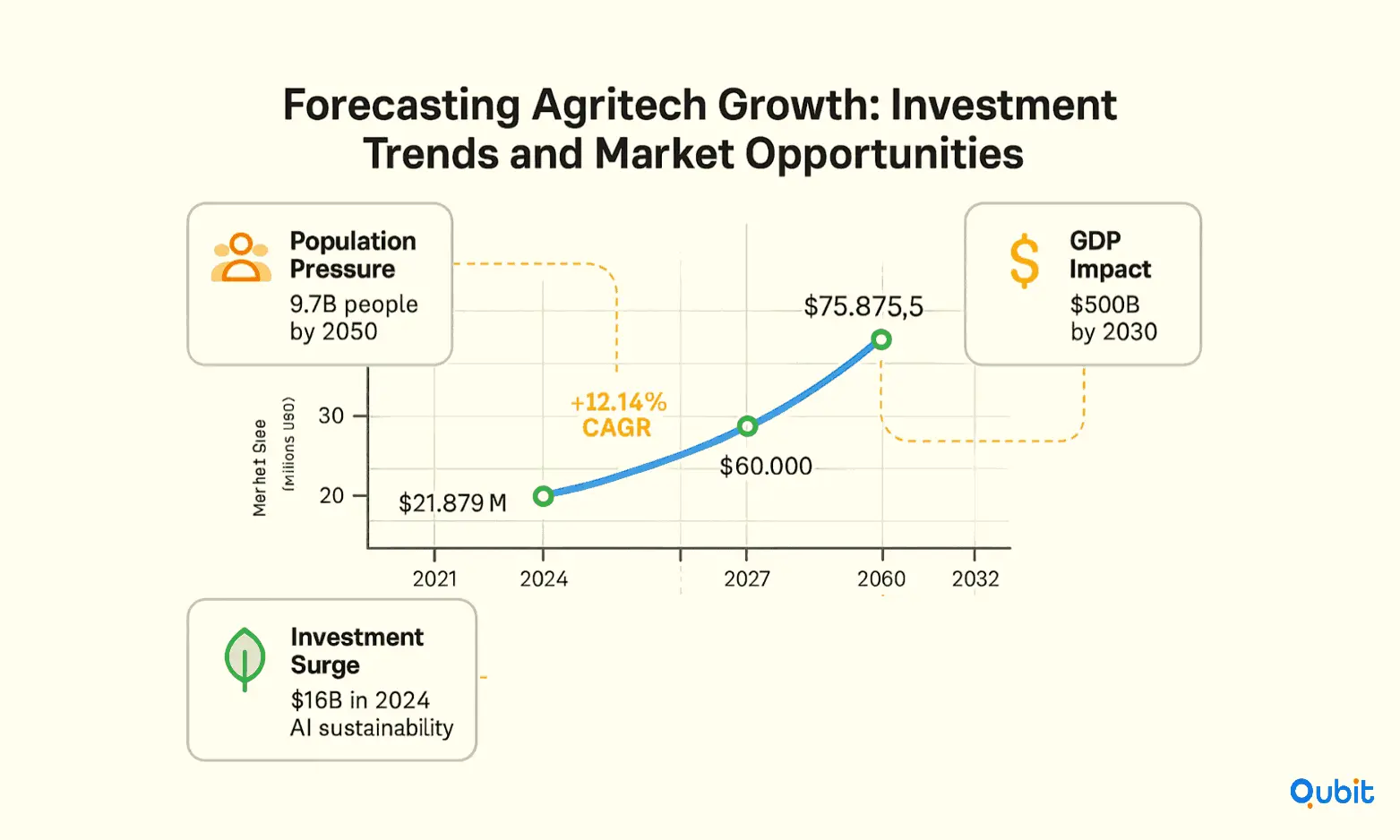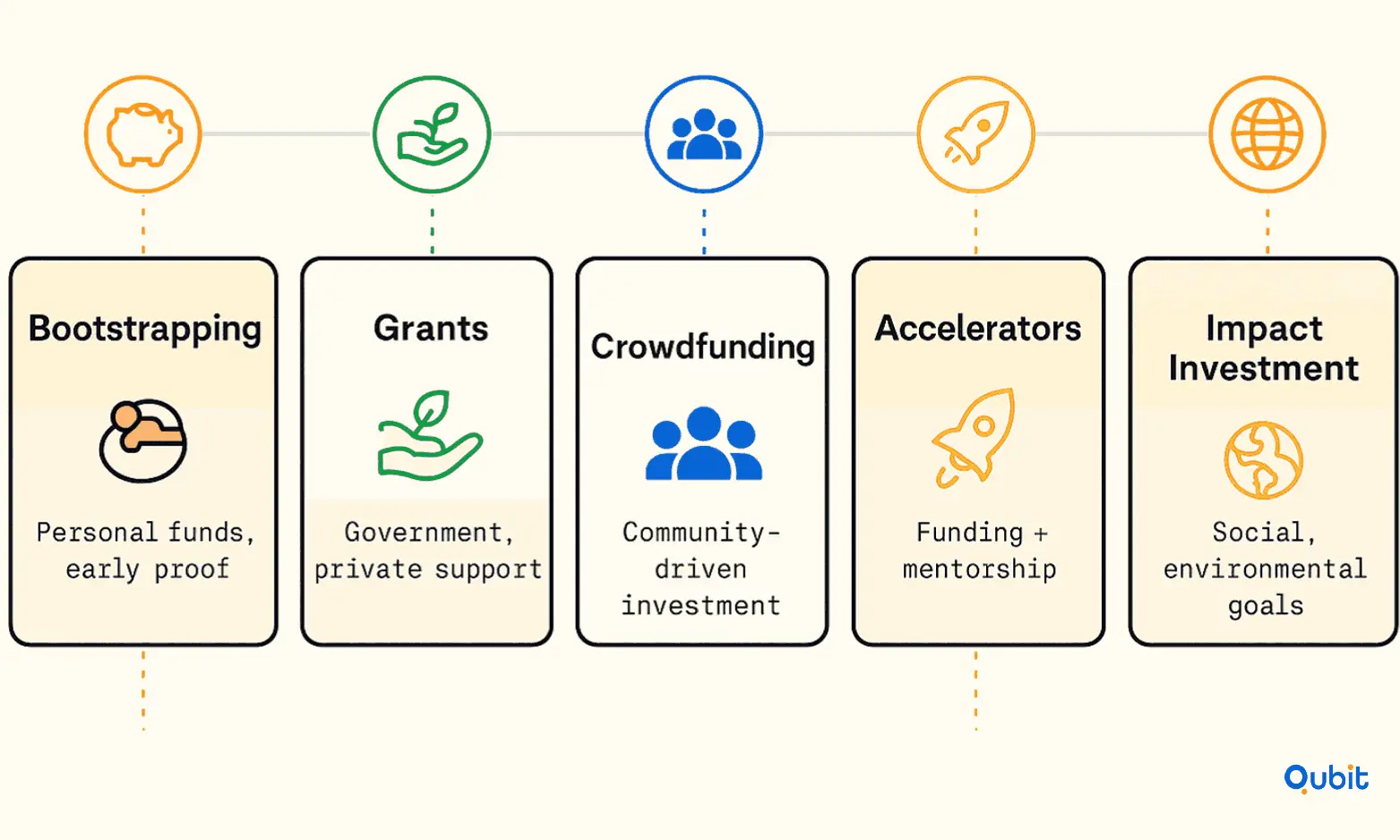Securing seed funding for AgriTech startups is often the first step toward transforming innovative ideas into impactful solutions. With agriculture and technology converging to address global challenges, early-stage funding plays a pivotal role in driving growth. From traditional investors to modern crowdfunding platforms, entrepreneurs have access to diverse funding avenues tailored to their unique needs.
Sector-specific insights are provided in angel investors foodtech, where investor profiles related to FoodTech ventures are examined. This resource highlights how specialized investors can support AgriTech startups aiming to revolutionize food production and sustainability.
This blog explores the most effective seed funding options, offering actionable insights to help founders secure the capital they need. Let’s jump right in!
Forecasting Agritech Growth: Investment Trends and Market Opportunities

The future of agritech market is poised for remarkable expansion, driven by technological innovation and increasing global food demands. With the agritech sector projected to achieve a Compound Annual Growth Rate (CAGR) of 12.14% between 2021 and 2027, its market valuation is expected to grow from $21,879M in 2021 to $43,500M by 2027. Looking further ahead, estimates suggest the market could reach $75,872.5M by 2032. These figures highlight the immense potential for investors and stakeholders to capitalize on this evolving industry.
Population growth is a significant factor fueling agritech advancements. As the global population is predicted to reach 9.7 billion by 2050, the demand for sustainable and efficient food production methods will intensify. See McKinsey population prediction for deeper insights on how a growing population influences agritech. Additionally, agritech’s contribution to global GDP could soar to $500B by 2030, with economists projecting a 7–9% increase in its GDP impact.
Investment trends are also shifting, with a notable surge in upstream and downstream funding. Research indicates global agrifoodtech funding could hit $16B in 2024, reflecting heightened interest in consumer-facing agritech ventures. Emerging markets are experiencing rapid growth, while innovations such as AI-driven climate solutions are integrating sustainability into agritech practices. Refer to Agritech market growth estimates to validate market size potential.
Smart Bootstrapping: Leveraging Pre-Seed Funding for Agritech Startups
Pre-seed agritech bootstrapping strategies can transform ambitious ideas into tangible results. Agritech startups often face unique challenges, such as high upfront costs and extended timelines for product development. Bootstrapping during the pre-seed phase enables founders to utilize personal resources and minimize early expenses while maintaining control over their vision.
Creating a robust Minimum Viable Product (MVP) is essential for demonstrating value to potential investors and customers. A well-planned MVP not only showcases the startup’s potential but also helps refine the product based on real-world feedback. Additionally, detailed business planning is critical during this stage.
Recurring revenue strategies can provide stability during the pre-seed phase. Subscription models or partnerships with agricultural businesses can generate consistent income, reducing reliance on external funding. Careful expense management is equally important, prioritize essential costs and avoid unnecessary spending to stretch limited resources effectively.
Understanding SBIR and STTR: Federal Funding for Agritech R&D
Federal agritech grants, such as those offered through the SBIR (Small Business Innovation Research) and STTR (Small Business Technology Transfer) programs, play a pivotal role in advancing agricultural technology. These initiatives provide early-stage funding to small businesses and research institutions, enabling them to explore innovative solutions for pressing challenges in agriculture.
The SBIR program focuses on empowering small businesses to conduct R&D with strong commercialization potential. Meanwhile, the STTR program emphasizes collaboration between businesses and research institutions, fostering a bridge between academic innovation and market-ready products. Both programs follow a phased funding approach, starting with feasibility studies and progressing to full-scale development.
For detailed eligibility requirements and deadlines, consult the SBIR program official site. Additionally, structuring your SBIR-focused presentations can be streamlined with resources like the Peter Thiel Pitch Deck Guide. These grants not only support groundbreaking R&D but also help agritech startups transition from concept to commercialization.
RBDG for Rural Agritech Expansions
Rural Business Development Grants (RBDG) play a pivotal role in fostering growth within the agritech sector in rural areas. These grants are designed to empower small businesses by providing the necessary funding to modernize operations, improve infrastructure, and explore innovative solutions tailored to rural challenges.
For agritech companies, RBDG funding opens doors to opportunities such as acquiring advanced equipment, conducting feasibility studies, and investing in research and development (R&D). These initiatives not only enhance productivity but also ensure that rural communities benefit from cutting-edge agricultural technologies.
By supporting projects aimed at rural modernization, RBDG helps bridge the gap between traditional farming practices and modern agritech advancements. Whether it’s precision farming tools or sustainable irrigation systems, these grants enable businesses to implement transformative solutions that drive long-term growth.
If you're exploring funding options for your rural agritech project, consider how RBDG can provide the financial boost needed to achieve your goals.
Leveraging State & Local Grants for Agritech Innovation
State grants for agritech are transforming the agricultural landscape by providing essential funding for innovation. These grants empower agritech businesses to develop cutting-edge solutions, enhance sustainability, and improve food production processes. Localized programs, such as the Meat and Poultry Inspection Readiness Grant Program, offer specialized funding for livestock and poultry initiatives. Explore Meat and Poultry Inspection Readiness Grant Program for specialized funding supplies in livestock and poultry.
State and local grants not only address industry-specific challenges but also encourage collaboration between public and private sectors. Programs like NYSERDA, CDFA, and FMPP exemplify the diverse opportunities available to agritech entrepreneurs. These initiatives focus on renewable energy, sustainable farming practices, and market development, ensuring that agritech businesses remain competitive and innovative.
By tapping into these resources, agritech companies can secure the financial support needed to scale their operations and drive meaningful change in the agricultural sector.
Securing Private Grants: Fueling Agritech Growth with Philanthropy
Private foundation agritech grants are becoming a cornerstone for innovation in agriculture. These grants, often provided by philanthropic organizations, offer essential funding to agritech startups and projects that aim to address global challenges like food security, climate change, and sustainable farming practices. Unlike traditional funding sources, private grants focus on long-term societal impact, making them an ideal match for agritech initiatives that prioritize regenerative agriculture and eco-friendly technologies.
Philanthropic foundations are particularly drawn to projects that align with their mission to create sustainable solutions. For instance, agritech ventures that develop precision farming tools or climate-resilient crops often find favor with these organizations. This alignment not only provides financial support but also opens doors to valuable networks and resources, further accelerating growth.
Moreover, private grants play a pivotal role in fostering technological innovation. By funding research and development, these grants enable startups to experiment with cutting-edge technologies without the immediate pressure of commercial returns. This freedom to innovate is crucial for addressing complex agricultural challenges, from reducing carbon footprints to improving soil health.
The impact of private foundation agritech grants extends beyond individual projects. By supporting initiatives focused on sustainability and regenerative practices, these grants contribute to a broader movement toward a resilient and equitable food system. This, in turn, enhances global food security and ensures that technological advancements benefit both farmers and the environment.
The Packard Foundation has emerged as a pivotal force in advancing sustainable agricultural technologies. By prioritizing agritech solutions that align with environmental conservation, the foundation is reshaping the future of farming. Through its Packard Foundation agritech grants, it supports initiatives that address critical challenges such as soil health, water conservation, and climate resilience.
These grants empower innovators to develop tools and practices that not only enhance productivity but also restore ecosystems. The foundation’s commitment to sustainable agriculture underscores its belief in fostering long-term solutions that benefit both farmers and the planet.
Rockefeller Foundation: Advancing Regenerative Agriculture and Food Security
The Rockefeller Foundation is driving transformative change in agriculture by championing regenerative practices and food security initiatives. Through its Rockefeller Foundation sustainability grants, the organization supports innovative solutions that prioritize soil health, biodiversity, and sustainable farming methods. These grants empower communities to adopt practices that not only restore ecosystems but also enhance agricultural productivity.
By focusing on regenerative agriculture, the foundation addresses critical challenges such as climate change, food insecurity, and environmental degradation. Their efforts aim to create resilient food systems that benefit both farmers and the planet. This commitment underscores the foundation's role in promoting sustainable practices that ensure long-term food security for vulnerable populations.
Strategic Alliances: Collaborative Growth in Agritech
Strategic alliances are reshaping the agritech industry, offering companies a pathway to expand their reach and capabilities. By forming corporate alliances in agritech, businesses can tap into shared expertise, access new markets, and accelerate innovation. These partnerships are particularly valuable in an industry where technology and agriculture intersect, requiring diverse skill sets and resources.
Equally important is setting measurable goals for these collaborations. Clear communication and shared objectives are the backbone of successful partnerships, ensuring that all parties work toward mutual benefits.
Strategic alliances in agritech are more than just business arrangements—they are catalysts for innovation and growth. By fostering collaboration, companies can overcome industry challenges and unlock their full potential.
Revolutionizing AgroTech Capital: Digital Fundraising Made Simple
Securing capital for agritech ventures has never been more accessible, thanks to the rise of digital fundraising platforms. These tools are reshaping how startups connect with investors, offering streamlined processes and broader reach. Digital fundraising for agritech not only simplifies the capital-raising journey but also empowers entrepreneurs to focus on innovation rather than administrative hurdles.
One of the standout advantages of digital tools is their ability to automate complex tasks. From creating compelling pitch decks to managing investor communications, these platforms save time and enhance efficiency.
AI-powered platforms are also playing a transformative role. By analyzing market trends and investor preferences, they help startups identify the right funding opportunities. This data-driven approach ensures that agritech innovators can secure capital tailored to their unique needs.
Seed Funding Options for AgriTech Startups
Securing seed funding is a pivotal step for AgriTech startups aiming to transform agricultural practices through innovation. With the right financial backing, these ventures can scale their operations, refine technologies, and address pressing challenges in the agricultural sector. This section explores diverse funding pathways tailored to early-stage AgriTech companies.

1. Bootstrapping and Personal Investment
Many founders begin their journey by relying on personal savings or contributions from friends and family. Bootstrapping allows startups to maintain full control over their operations while proving their concept in the market. However, this approach often limits scalability, making it essential to transition to external funding sources as the business grows.
2. Government and Private Grants
Governments worldwide recognize the importance of AgriTech in addressing food security and sustainability. Programs such as the USDA’s Small Business Innovation Research (SBIR) grants in the U.S. or Horizon Europe’s funding initiatives provide financial support to startups focused on agricultural innovation. Private organizations and foundations also offer grants targeting specific areas like climate-smart agriculture or precision farming.
3. Crowdfunding Platforms
Crowdfunding has emerged as a popular alternative for AgriTech startups seeking community-driven investment. Platforms like Kickstarter and Indiegogo allow entrepreneurs to showcase their ideas and attract contributions from individuals who believe in their vision. Alternative financing models are discussed in crowdfunding agritech startups, offering you an overview of community-driven investment approaches.
4. Accelerator and Incubator Programs
Accelerators and incubators provide more than just funding—they offer mentorship, networking opportunities, and access to industry experts. Programs like Yield Lab or AgFunder’s accelerator initiatives are tailored to AgriTech startups, helping them refine their business models and scale effectively. Structured support patterns are analyzed in agritech accelerator programs, illustrating how mentorship and funding combine to boost startup growth.
5. Impact Investment
Impact investors focus on funding ventures that generate measurable social or environmental benefits alongside financial returns. For AgriTech startups, this can mean securing funding from organizations dedicated to sustainable agriculture, climate change mitigation, or rural development.
Choosing the Right Path
Selecting the ideal seed funding option depends on your startup’s goals, stage of development, and target market. Combining multiple funding sources often creates a robust capital stack, ensuring both immediate and long-term financial stability.
Deep Dive: Specialized Agritech Funding Mechanisms
Securing financial backing for agritech ventures often requires a nuanced approach tailored to the unique demands of the industry. Specialized agritech funding mechanisms cater to these needs, offering solutions that align with the sector's challenges, such as long development cycles and unpredictable market conditions. These mechanisms include grants, venture capital, and debt financing, each designed to address specific stages of growth.
For instance, grants from government bodies or agricultural organizations can provide non-dilutive funding for research and development. Venture capital, on the other hand, is ideal for scaling operations, especially when paired with investors who understand the agritech landscape. Debt financing, while less common, can be a viable option for startups with predictable revenue streams.
A broad framework is outlined in how to secure funding for agritech startups, where diverse financing strategies are contextualized for your deeper exploration. By understanding these mechanisms, agritech entrepreneurs can optimize their funding strategies to drive innovation and growth.
Conclusion
Securing seed funding is a pivotal step in transforming your startup vision into reality. Throughout this blog, we’ve explored key strategies and actionable insights to help you craft a compelling, narrative-driven funding approach. From understanding the importance of storytelling to identifying diverse funding options, each step plays a critical role in building a strong foundation for your startup’s financial growth.
A clear, multi-faceted funding strategy not only enhances your chances of success but also positions your startup as a credible and attractive investment opportunity. Take the time to evaluate the various funding avenues available, ensuring they align with your business goals and long-term vision.
If you’re ready to accelerate your seed funding efforts, our Fundraising Assistance service is designed to secure the capital you need for growth. Contact us today to learn more about how we can support your journey.
Key Takeaways
- AgriTech startups have diverse seed funding options ranging from bootstrapping to structured investor outreach.
- Government and private grants each play a crucial role in early-stage funding.
- Robust planning and MVP validation are key for successful bootstrapping.
- Strategic alliances and digital fundraising tools are transforming capital raising in agritech.
- A clear, narrative-driven funding strategy is essential for attracting the right investors.
Frequently asked Questions
What is seed funding in agritech?
Seed funding in agritech refers to the initial capital provided to early-stage startups in the agriculture technology sector to develop products and validate business models.


 Back
Back



